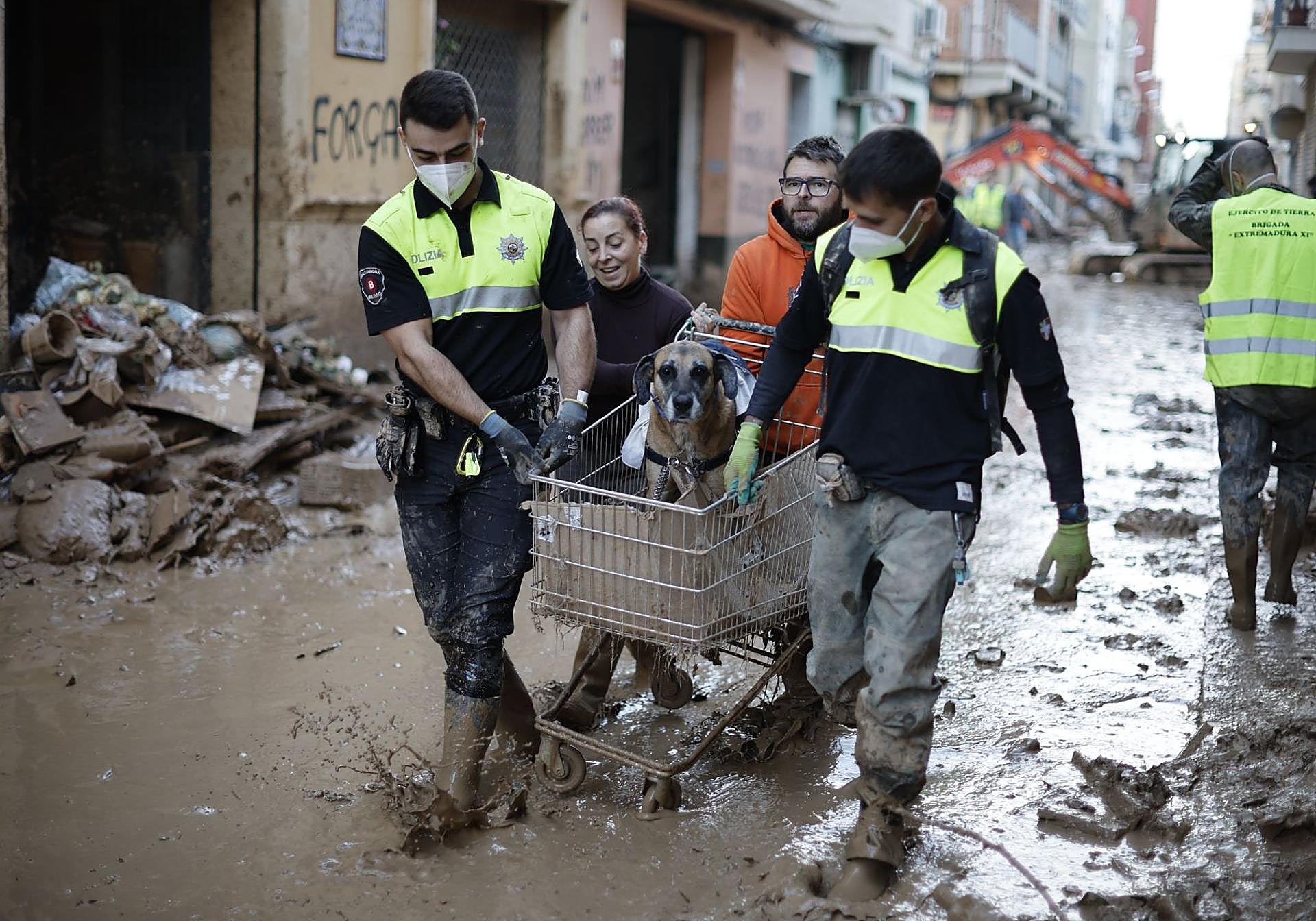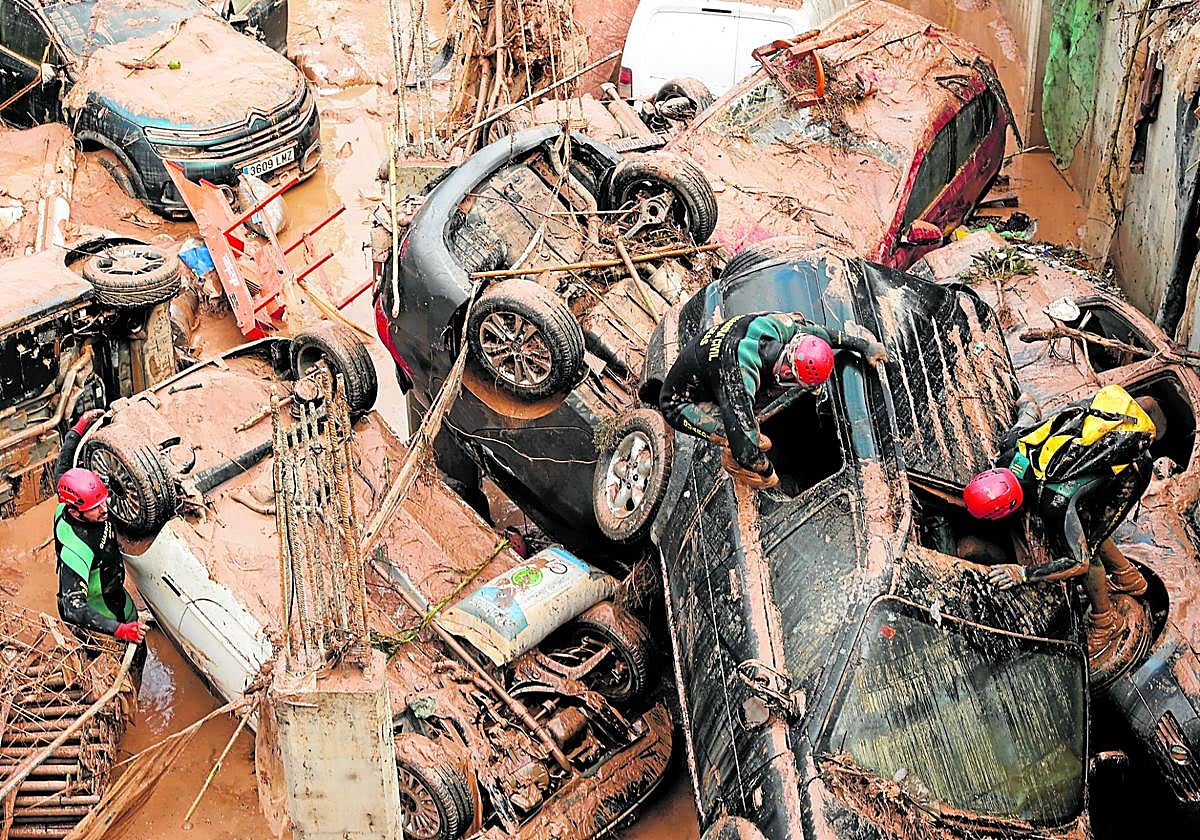Valencia begins to slowly pick up the pieces after deadly 'Dana' storm
As the desperate search for those missing goes on, the clean up continues and the human and economic effects of the flood are starting beginning to be felt
SUR
Malaga / Valencia
Friday, 8 November 2024, 11:20
Large parts of Spain affected by last week's flash floods were officially declared Disaster Zones on Thursday morning this week as national government ramped up its relief effort and support. The effects of the cut-off-low-pressure storm, known as a 'Dana', were being ranked as Spain's most costly natural disaster ever. Political leaders had been under increasing pressure as the days went on to do more and faster to help locals rebuild their lives. Tensions had boiled over in dramatic form on Sunday afternoon in Paiporta - in the worst affected area - when a visit by the King and Queen with the prime minister and regional president turned violent for a time.
More and faster aid
The declaration of a disaster zone allows the government to channel aid faster to those in need. In addition, Prime Minister Pedro Sánchez has unveiled a 10.6-billion-euro package of aid measures.
Among the many relief measures included with that, the Spanish government will provide up to 72,000 euros for cases of disability, between 20,000 and 60,000 euros for the repair of damaged homes and up to 10,300 euros to replace or repair furniture, electrical appliances and household goods.
In addition, affected companies that temporarily suspend the activity of their workers through an ERTE furlough will be exempt from paying social security contributions at least until next February. Self-employed workers can also claim part of their salary, in steps similar to the Covid pandemic.
The death count in Spain on Thursday was 219 with almost all victims around the south Valencia area. Those still missing in that area amounted to 93, officials said, however many bodies recovered had still to be identified.
Meticulous searches continued, especially in basements and underground car parks now more heavy-lifting equipment had arrived in recent days. There was relief when a search of the car park of the badly damaged Bonaire shopping centre, the largest parking lot in the Valencia region, concluded with no fatalities found. On the nearby Mediterranean rescue boats were looking for any bodies that had been swept out to sea.
Beyond the anguish of loss of life and waiting for news of missing loved ones, the clean up operation continued.
There was growing concern about health risks and possible outbreaks of disease as the streets stayed filthy and normal sanitation broke down. Some volunteers were overcome by fumes while cleaning out a garage last Saturday and warnings also went out about using motorised pumps in enclosed spaces.
Faced with the overwhelming goodwill of the public, on Thursday Valencia city council asked people not to donate more food or clothes but to bring cleaning and hygiene products instead.

Zoom

Road disruption
Many main roads in and around Valencia city remained closed, with some likely to be shut for weeks or months. Normally quick journeys were taking hours. The area's metro network, also badly hit, had been replaced by bus routes.
The economic effects of the destruction of farms and their crops, factories and distribution networks was only starting to be felt. In one town alone, Alzira, local officials estimated the cost of damage to agricultural land was around 35 million euros.
The death toll was over 200 and the list of missing persons stood at 93 on Thursday this week. The sudden low pressure storm had left not only a huge trail of bodies and multi-million-euro destruction but also a strange sense of loneliness among those affected, who had seen too many days pass without receiving the attention they needed.
The perception that first the warning mechanisms and then the response strategy failed was growing. And the response of political leaders until just the middle of this week was light years away from the sensitivity deserved by shattered families who have seen their lives and belongings destroyed. That public response leaves a number of officials under the microscope.
Sunday's visit
Last Sunday, the prime minister, Pedro Sánchez, along with the King and Queen and Carlos Mazón, the president of the Valencia regional government, witnessed the anger of the residents of Paiporta, at ground zero of the storm, at the slowness of the state's response to the tragedy.
Sánchez, despite the obvious seriousness of the situation, has refused to activate a Level 3 emergency under the national civil protection system, which would have led to the declaration of a national emergency and would have seen central government assuming sole command.
For reasons that are hard to understand, unless some kind of political calculation is involved, Sánchez has preferred to leave the management of a tragedy of this magnitude with a regional government, in the hands of his political rivals, that clearly lacks the necessary ingredients to deal with it. And above all, there is the exasperating slowness in the deployment of much needed emergency, health, police and civil protection resources, which were not definitively put in place until the visit of the King and Queen. Too much of a sense of political calculation, which is not compensated for by aid - the 10.6 billion - which is clearly not enough to restore normality to the province of Valencia.
Regional government
Carlos Mazón, head of the Valencia government, is the political decision-maker who has been most criticised for the management of the storm. The slow response, first to the data provided by the state body monitoring water levels in the rivers, the untimely telephone alert to the population and, later, the failure to immediately request Level 3 from the government so that it could take over the management of this crisis was a catalogue of errors. Mazón is undoubtedly facing the most serious political crisis since he took over the Valencia government, surrounded by a team of ministers whose lack of experience and determination have made them ineffective.
Locals' frustration at all that is happening, or not, boiled over very publicly on the Sunday visit of the King and Queen to Paiporta. With them, as they got out of the cars, was Sánchez and Mazón. As mud and sticks started to be thrown, Sánchez was ushered away in his vehicle. He later claimed he had been hit on arrival by a stick - which investigators said they had been unable to prove - and his officials blamed "organised far-right agitators." Mazón stayed longer but also withdrew.
This left the King and Queen talking to residents. Queen Letizia was hit by some mud, the mark visible on her face as she consoled those there. They were widely praised for lingering although the second part of the visit, to the town of Chiva, where it had rained the most, was postponed.
